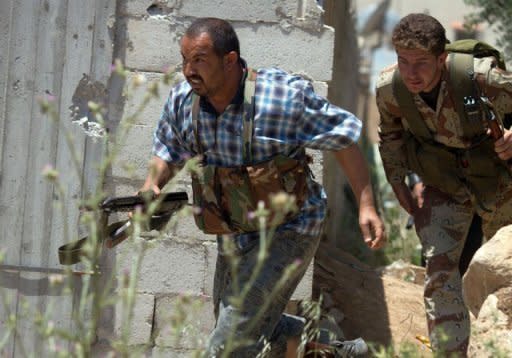Syria troops storm village, month-old truce in tatters
Troops stormed a village in central Syria on Sunday and rained shells on rebel strongholds Douma and Rastan, monitors said, as a UN-backed truce entered a second month looking in tatters. The assault on Al-Tamanaa Al-Ghab village in Hama province, a hotbed of opposition to President Bashar al-Assad's regime, killed five civilians, wounded 18 and saw houses torched, the Syrian Observatory for Human Rights said. Clashes between troops and deserters in the southern province of Daraa, meanwhile, saw five soldiers killed, it said. Two civilians died in the crossfire. The watchdog said at least 30 people -- 22 civilians, six soldiers and two rebels -- were killed in a surge of violence in various flashpoints on Sunday, despite a ceasefire brokered by UN-Arab League peace envoy Kofi Annan that was supposed to take effect on April 12. The Local Coordination Committees (LCC), a coalition of opposition activists on the ground, said the Syrian army shelled Douma near Damascus on Sunday and that heavy gunfire was also heard in the suburb of the capital. The LCC also said the town of Rastan in central Homs province also came under heavy bombardment, with one activist reporting "one rocket a minute" slamming into the rebel-hand town. The violence in Syria has escalated over the past week, despite the arrival of more ceasefire observers. The UN mission in Syria said on Sunday it now has 189 military observers on the ground, nearly two-thirds of its planned strength of 300. The observers are tasked with shoring up the ceasefire, which has been broken daily by both sides to the conflict. Twin suicide bombings in Damascus on Thursday that killed 55 people and wounded 372 have raised fears that extremist elements are taking advantage of the deadlock in Syria to stoke the unrest. Al-Nusra Front, an Islamist group unknown before the Syrian revolt, released a video on Saturday claiming responsibility for the Damascus attacks as revenge for regime bombing of residential areas in several towns and to avenge Sunnis killed by forces loyal to Assad, a member of the Alawite offshoot of Shiite Islam. Claims by the group, including for past bombings, have been difficult to verify. State media have accused the West and its regional allies of opening the door to Al-Qaeda through its backing of the opposition. The head of the dissident Free Syrian Army in remarks published on Sunday charged that Al-Qaeda had links with the powerful airforce intelligence agency of the regime. "If Al-Qaeda militants have indeed entered the country, it happened with the cooperation of that agency," FSA chief Colonel Riyadh al-Asaad told Kuwait's Al-Rai newspaper. Asaad dismissed claims by Damascus that jihadist and Salafi groups were active in Syria, and blamed the Syrian regime for Thursday's devastating bomb blasts in the capital. More than 12,000 people, the majority of them civilians, have died since the Syrian uprising began in March 2011, according to the Observatory, including more than 900 killed since the April 12 truce. A Turkish journalist held prisoner in Syria for two months said on Sunday that he and a Turkish cameraman feared they would die and had spent 55 days isolated in cramped cells where they slept on the floor. The two Turks, who were arrested by a pro-regime militia in March and handed over to Syrian intelligence, returned to Istanbul this weekend after being freed thanks to Iranian mediation. European Union foreign ministers are to meet in Brussels on Monday to discuss a new round of sanctions on Syria, with diplomats saying these would include an assets freeze and visa ban on two firms and three people. "There is an agreement in principle" between ambassadors of the 27-nation bloc on a 15th round of sanctions against Assad's regime over its crackdown against dissent, an EU diplomat said. In neighbouring Lebanon, three people were killed and 17 wounded in weekend clashes between pro- and anti-Assad camps in the northern city of Tripoli that also dragged in the army, Lebanese security sources said. Gunfire first broke out on Saturday as young demonstrators, sympathisers of the revolt in Syria, tried to approach the offices of the pro-Assad Syrian Social Nationalist Party. Speaking in Rome, Syrian opposition leader Burhan Ghalioun on Sunday told ANSA news agency that he was ready to hand over the chairmanship of the Syrian National Council (SNC) to others to broaden its appeal. The SNC is supposed to appoint a new chairman every three months, but Ghalioun has remained leader since the council was set up in October 2011 because of lack of agreement over a successor. Ghalioun was last re-appointed chairman on February 15. "I might not be confirmed (again) to the SNC chairmanship. As far as I'm concerned a new leader could be selected so that everyone can be given a chance to serve the opposition," he said.




